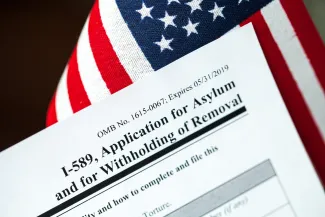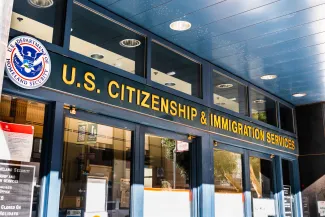
Colorado sheriff’s deputy who prompted Utah student’s ICE arrest placed on leave
A Mesa County sheriff’s deputy who shared information that led federal immigration officers to arrest a Utah college student in Grand Junction has been placed on leave pending an internal investigation.
The Mesa County Sheriff’s Office said earlier this week that federal authorities had “extrapolated” information about Caroline Dias Goncalves’ immigration status from information sent by Investigator Alexander Zwinck via the encrypted messaging app Signal to a group organized by federal law enforcement for drug interdiction efforts.

Zwinck pulled over Dias Goncalves on Interstate 70 near Fruita on June 5 for driving too close to a tractor-trailer, and although she was let go with a warning she was detained a short time later by Immigration and Customs Enforcement agents. Body camera footage released by the department shows Zwinck asking Dias Goncalvez, who was born in Brazil and brought to the U.S. by her parents as a 7-year-old, whether she was “born and raised” in Utah, after noting she had “a little bit of an accent.”
Colorado law generally prohibits cooperation and information-sharing between local law enforcement agencies and federal immigration authorities. ICE representatives have ignored questions about the incident from Newsline and other media outlets.
The sheriff’s office declined this week to answer follow-up questions about the content of the Signal message and its intended purpose, but it said in an updated statement Thursday that it was “reviewing communications” sent by its officers to the group chat as it investigates whether the message complied with state law and departmental policies.
“This includes, but is not limited to, working to understand if and when Mesa County Sheriff’s Office employees were made aware that the information shared for drug interdiction efforts was being utilized for immigration enforcement,” the statement said.
Whether Zwinck faces disciplinary action “will be determined by the outcome of the full administrative investigation,” it added.

© Sundry Photography - iStock-1189510256
The arrest of Dias Goncalves, a nursing student at the University of Utah with no criminal record, sparked an outcry from national groups that advocate on behalf of “Dreamers,” young adults who lack permanent legal status after being brought to the U.S. as children.
“Caroline — and Ximena Arias Cristóbal and numerous other Dreamers recently detained and even deported — should have never been targeted in the first place,” Gaby Pacheco, president of the advocacy group TheDream.US, said in a press release. “America’s national interests are better served by delivering education and legal status for Dreamers instead of raids, detentions, and deportations.”
Tensions over immigration enforcement have risen across the country in recent weeks as President Donald Trump’s administration, seeking to fulfill its promised mass-deportation campaign, has ordered ICE to dramatically broaden the scope of its operations. Contrary to claims by the Trump administration that its efforts are targeting violent criminals, the share of people held in ICE detention with no criminal record has risen sharply since January.
Dias Goncalves is expected to be released from the ICE detention facility in Aurora in the coming days after an immigration judge in Denver granted her bond on Wednesday. Her attorney, Jon Hyman, said that she and her family were requesting privacy after the “traumatic past few weeks.”
“We know that Caroline’s arrest and detention should not have happened in the first place,” Hyman said in a statement. “Investigations should continue to ensure that other young immigrants in Colorado do not have to go through the same harrowing experiences.”
















